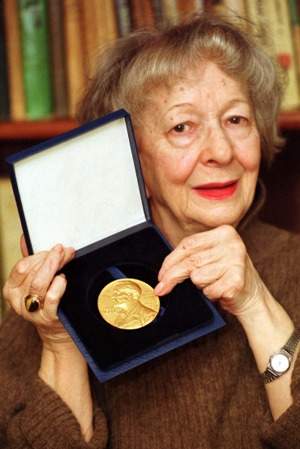

Nobel Lecture, December 7, 1996
They say the first sentence in any speech is always the hardest. Well, that one’s behind me, anyway. But I have a feeling that the sentences to come – the third, the sixth, the tenth, and so on, up to the final line – will be just as hard, since I’m supposed to talk about poetry. I’ve said very little on the subject, next to nothing, in fact. And whenever I have said anything, I’ve always had the sneaking suspicion that I’m not very good at it. This is why my lecture will be rather short. All imperfection is easier to tolerate if served up in small doses.
Contemporary poets are skeptical and suspicious even, or perhaps especially, about themselves. They publicly confess to being poets only reluctantly, as if they were a little ashamed of it. But in our clamorous times it’s much easier to acknowledge your faults, at least if they’re attractively packaged, than to recognize your own merits, since these are hidden deeper and you never quite believe in them yourself … When filling in questionnaires or chatting with strangers, that is, when they can’t avoid revealing their profession, poets prefer to use the general term “writer” or replace “poet” with the name of whatever job they do in addition to writing. Bureaucrats and bus passengers respond with a touch of incredulity and alarm when they find out that they’re dealing with a poet. I suppose philosophers may meet with a similar reaction. Still, they’re in a better position, since as often as not they can embellish their calling with some kind of scholarly title. Professor of philosophy – now that sounds much more respectable.
But there are no professors of poetry. This would mean, after all, that poetry is an occupation requiring specialized study, regular examinations, theoretical articles with bibliographies and footnotes attached, and finally, ceremoniously conferred diplomas. And this would mean, in turn, that it’s not enough to cover pages with even the most exquisite poems in order to become a poet. The crucial element is some slip of paper bearing an official stamp. Let us recall that the pride of Russian poetry, the future Nobel Laureate Joseph Brodsky was once sentenced to internal exile precisely on such grounds. They called him “a parasite,” because he lacked official certification granting him the right to be a poet …
Several years ago, I had the honor and pleasure of meeting Brodsky in person. And I noticed that, of all the poets I’ve known, he was the only one who enjoyed calling himself a poet. He pronounced the word without inhibitions.
Just the opposite – he spoke it with defiant freedom. It seems to me that this must have been because he recalled the brutal humiliations he had experienced in his youth.
In more fortunate countries, where human dignity isn’t assaulted so readily, poets yearn, of course, to be published, read, and understood, but they do little, if anything, to set themselves above the common herd and the daily grind. And yet it wasn’t so long ago, in this century’s first decades, that poets strove to shock us with their extravagant dress and eccentric behavior. But all this was merely for the sake of public display. The moment always came when poets had to close the doors behind them, strip off their mantles, fripperies, and other poetic paraphernalia, and confront – silently, patiently awaiting their own selves – the still white sheet of paper. For this is finally what really counts.
To read her whole speech, click HERE.
A portrait of the Polish poet and winner of the 1996 Nobel Prize in literature, Wislawa Szymborska, at the ceremony where she was decorated with the Order of the White Eagle of Poland, the highest decoration given to civilians in Poland.